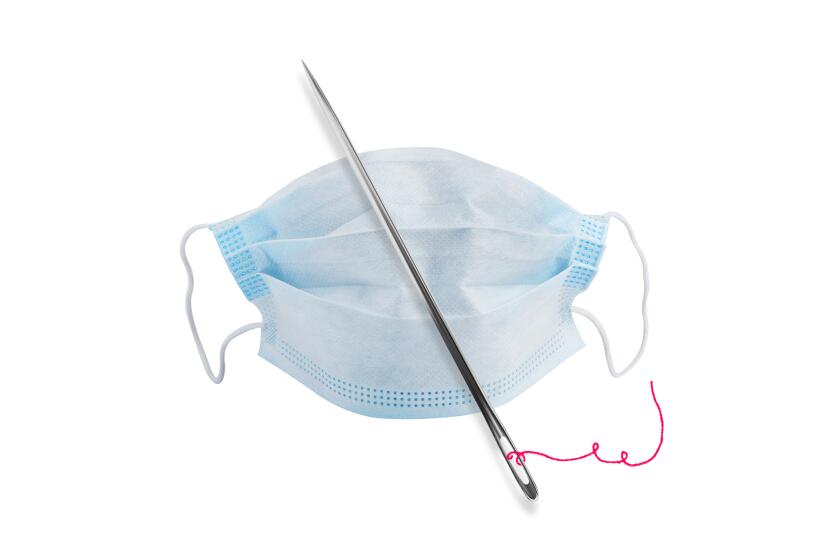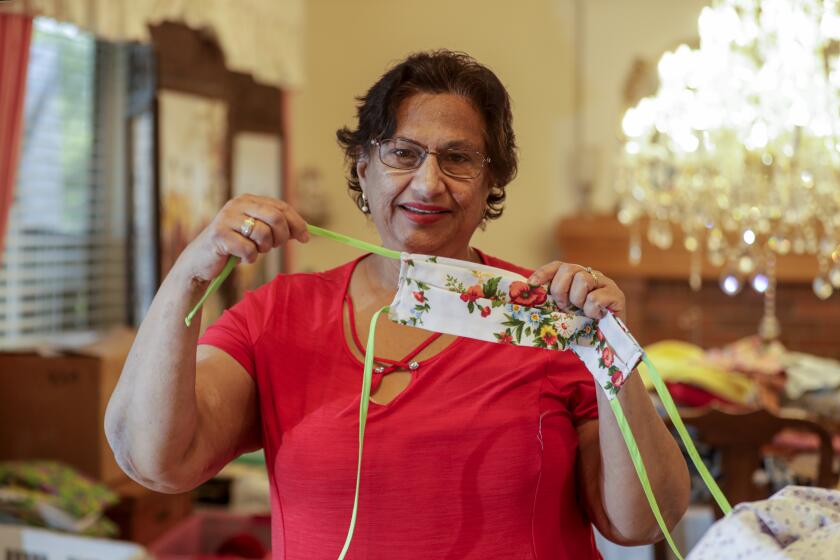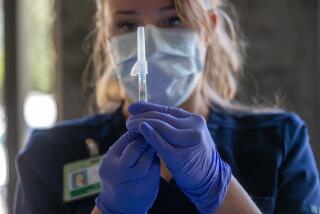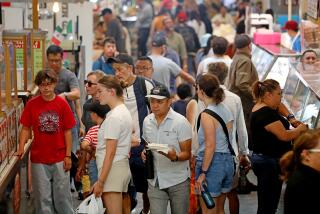What you need to know about L.A.’s mandatory coronavirus mask, face covering rules
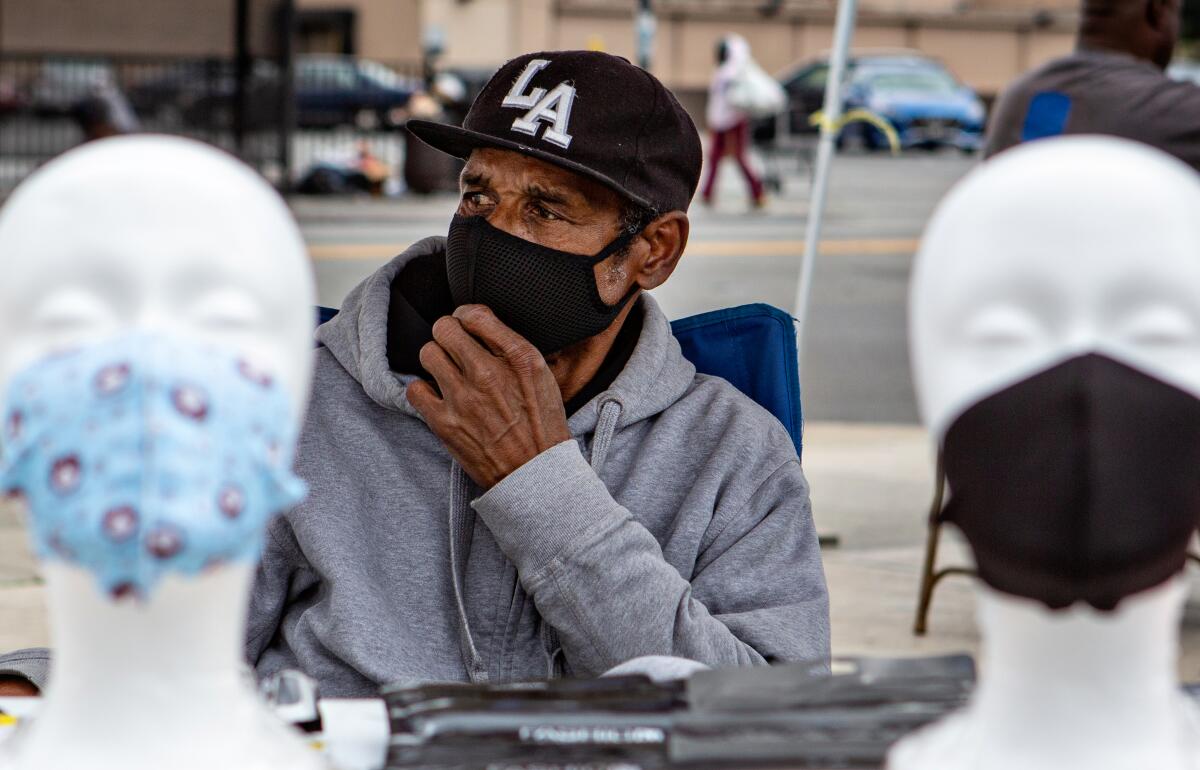
Effective Friday, Los Angeles residents must wear a mask, bandanna or other type of covering over their noses and mouths when in grocery stores and other essential businesses under an order from Mayor Eric Garcetti. Workers at many businesses must also cover their faces.
It’s the latest step to try to slow the spread of the coronavirus. It’s designed to protect employees and customers.
Here are the details:
What about employees?
Workers at most essential businesses must wear face coverings, which business owners must either provide or reimburse workers for buying.
If a business refuses to provide face coverings for its workers, it could be fined, but the hope is that businesses and customers will follow the order without issue, Garcetti said.
The latest updates from our reporters in California and around the world
What are the details?
The order does not require that customers’ or workers’ face coverings be medical grade or N95 masks. Local and state leaders continue to plead with the public to refrain from buying those masks to ensure medical and emergency workers have enough protective gear to safely perform their jobs.
“All essential, nonmedical workers required to wear these face coverings must frequently (at least once a day) wash any reusable face coverings, for the health and safety of themselves and others,” the order reads. “Single-use face coverings must be properly discarded into trash receptacles.”
But Garcetti said if residents see someone in the grocery store or in public wearing an N95 mask, they shouldn’t assume the person is not following the order.
“There are people who are immuno-compromised who do need to wear those masks,” Garcetti said.
What about other outdoor activities?
The order does not require people who are exercising alone outside to wear face coverings, but instead, focuses on when people are in public places where they cannot always remain six feet apart from others.
“Our idea is not to be arresting and fining people for the face coverings. Just as if tomorrow everybody decided to jaywalk across the street, we wouldn’t have close to enough law enforcement officers or city workers to stop everybody from jaywalking,” Garcetti said. “This is about self-enforcement mostly.”
DIY coronavirus mask instructions from crafters and doctors.
Who is covered by the essential worker order?
According to the mayor’s order:
— Grocery stores, water retailers, farm and produce stands, supermarkets, convenience stores, warehouse stores, food banks, certified farmers markets and other establishments engaged in the retail sale of canned food, dry goods, fresh fruits and vegetables, pet food and medication supply (but not grooming or training), fresh or frozen meats, fish and poultry, any other household consumer products (such as construction supplies, cleaning and personal care products)
— Organizations and businesses that provide food, social services and other necessities of life for economically disadvantaged or otherwise needy individuals (including gang prevention and intervention, domestic violence and homeless services agencies)
— Hardware and building supply stores, day labor centers and nurseries
— Plumbers, electricians, exterminators, custodial/janitorial workers, handyman services, funeral home workers and morticians, moving services, HVAC installers, carpenters, day laborers, landscapers, gardeners, property managers and leasing agents and private security personnel
— Laundromats, dry cleaners and laundry service providers
— Restaurants and retail food facilities that prepare and offer food to customers, but only via delivery service, to be picked up or drive-through
— Individuals and businesses that ship or deliver groceries, food, beverages or goods directly to residences or businesses
— Taxis, ride-sharing services, car rental companies and other private transportation services
— Hotels, motels and shared rental units
What about other areas?
Federal and state officials have recommended wearing face coverings when going out.
Over the weekend, Dr. Cameron Kaiser, Riverside County’s public health officer, called for residents to stay home, but if they had an essential errand or appointment, to wear a face mask when going out. He also stated that residents shouldn’t have gatherings — of any number — outside of the people who live in their home.
Law enforcement agencies have the authority to enforce these orders, which run through April 30, “as they deem necessary,” according to county officials.
But Riverside County Sheriff Chad Bianco said that the department wouldn’t be setting up “any type of police state” in Riverside County. Deputies also won’t be stopping vehicles or setting up checkpoints for motorists, and they won’t be stopping residents while they are out on a walk with their families. Deputies also won’t stop or ticket residents simply for not wearing a mask, he said.
Bianco asked residents not to call 911 to report potential violators. Doing so, he said, affects their ability to respond to “emergencies and critical calls.”
Nearby San Bernardino County also is requiring residents to wear masks.
Face coverings and masks may help to stem the spread of the coronavirus. But how to keep them clean?
What do experts say about face coverings?
There is a growing belief coverings can help, but only in conjunction with other safeguards. Experts say face masks alone are not particularly effective in preventing infection. They don’t cover the eyes, for instance, and a bit of coughed saliva that sprays into the eye can cause an infection.
Wearing a mask but still touching your face with unwashed, virus-contaminated hands can also lead to infection. People often find masks uncomfortable and touch them to make adjustments.
But even if they don’t provide full protection to the wearer, they can protect others nearby.
Dr. Otto Yang, an infectious diseases expert at UCLA, said he thinks universal mask-wearing has helped keep the virus under control in places like Singapore and Taiwan.
“My personal opinion is that that’s probably been an important thing in other countries flattening their curve,” he said. “If you go to Taiwan or Singapore, everyone’s got a mask on all the time. Healthy or not. Sick or not.”
The California Department of Public Health has these guidelines for cloth masks:
- Face coverings can be made out of cloth, be factory-made or hand-sewn, or improvised using bandannas, scarves, T-shirts, sweatshirts or towels.
- The material should cover the nose and mouth.
- Ideally, face coverings should be washed after each use. Dirty masks should be placed in a dedicated laundry bag or bin.
- Use detergent and hot water when washing cloth masks, and dry them on a hot cycle.
- Be sure your mask is comfortable; you don’t want to have to keep adjusting the mask because that means touching your face.
- Wash your hands, or use hand sanitizer, before and after touching your face or face coverings.
- If you must re-wear your cloth face covering before washing it, wash your hands immediately after putting it back on and avoid touching your face.
More to Read
Sign up for Essential California
The most important California stories and recommendations in your inbox every morning.
You may occasionally receive promotional content from the Los Angeles Times.
